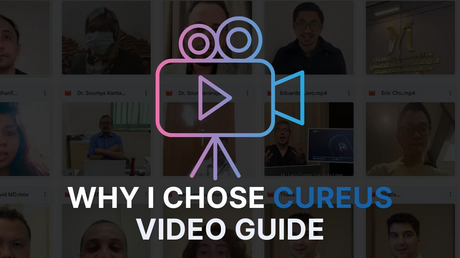Newsroom
Latest Highlighted Family Medicine Articles
We’re back with another edition of Cureus U - our monthly curated collection of recently published family medicine articles that might interest you. All Cureus articles are Open Access so take a look and let us know what you think! Now you can subscribe and unsubscribe to several specialty digests and the “Most Popular” digest by visiting your email preferences page.
Dec 29, 2025
Latest Epidemiology/Public Health Articles
We’re back with another edition of Cureus U - our monthly curated collection of recently published epidemiology/public health articles that might interest you. All Cureus articles are Open Access so take a look and let us know what you think! Now you can subscribe and unsubscribe to several specialty digests and the “Most Popular” digest by visiting your email preferences page.
Dec 29, 2025
Latest Highlighted Emergency Medicine Articles
We’re back with another edition of Cureus U - our monthly curated collection of recently published emergency medicine articles that might interest you. All Cureus articles are Open Access so take a look and let us know what you think! Now you can subscribe and unsubscribe to several specialty digests and the “Most Popular” digest by visiting your email preferences page.
Dec 29, 2025
Latest Highlighted Endocrinology Articles
We’re back with another edition of Cureus U - our monthly curated collection of recently published endocrinology articles that might interest you. All Cureus articles are Open Access so take a look and let us know what you think! Now you can subscribe and unsubscribe to several specialty digests and the “Most Popular” digest by visiting your email preferences page.
Dec 29, 2025
Latest Highlighted Dermatology Articles
We’re back with another edition of Cureus U - our monthly curated collection of recently published dermatology articles that might interest you. All Cureus articles are Open Access so take a look and let us know what you think! Now you can subscribe and unsubscribe to several specialty digests and the “Most Popular” digest by visiting your email preferences page.
Dec 29, 2025
Latest Highlighted Dentistry & Oral Medicine Articles
We’re back with another edition of Cureus U - our monthly curated collection of recently published obstetrics & gynecology articles that might interest you. All Cureus articles are Open Access so take a look and let us know what you think! Now you can subscribe and unsubscribe to several specialty digests and the “Most Popular” digest by visiting your author profile.
Dec 29, 2025
Latest Highlighted Cardiology Articles
We’re back with another edition of Cureus U - our monthly curated collection of recently published cardiology articles that might interest you. All Cureus articles are Open Access so take a look and let us know what you think! Now you can subscribe and unsubscribe to several specialty digests and the “Most Popular” digest by visiting your email preferences page.
Dec 29, 2025
Latest Highlighted Anesthesiology Articles
We’re back with another edition of Cureus U - our monthly curated collection of recently published anesthesiology articles that might interest you. All Cureus articles are Open Access so take a look and let us know what you think! Now you can subscribe and unsubscribe to several specialty digests and the “Most Popular” digest by visiting your email preferences page.
Dec 29, 2025
Latest Highlighted Allergy & Immunology Articles
We’re back with another edition of Cureus U - our monthly curated collection of recently published allergy & immunology articles that might interest you. All Cureus articles are Open Access so take a look and let us know what you think! Now you can subscribe and unsubscribe to several specialty digests and the “Most Popular” digest by visiting your email preferences page.
Dec 29, 2025
November 2025 Newsletter
Welcome to your November Cureus update! Thank you for being part of the Cureus community and for helping advance our mission to make medical knowledge open and accessible worldwide. Important Service Update: To ensure you continue receiving Cureus research updates, publishing opportunities, and medical insights, please move this message to your primary inbox and add Cureus to your safe sender list.
Nov 14, 2025
Why I Chose Cureus Video Guide
Are you a clinician, or healthcare researcher who’s published with Cureus? This guide is for you, whether you're early in your publishing journey or have years of academic experience. Why Make a Video? You’ve already taken a big step by publishing your work. Now it’s time to share why. These short videos will be featured on Cureus’ social media platforms (YouTube, LinkedIn, Instagram, Facebook, X) and in other promotional ways to: Help Others Discover the Right Path Your story can guide new authors, students, trainees, and researchers who are unsure how or where to start. Elevate Your Academic Profile and Get Noticed Showcase your voice and leadership through video testimonials demonstrating communication skills, initiative, and a strong professional presence. Inspire a Global Community Highlight the knowledge and diversity of authors publishing with Cureus from around the world. Who Should Submit? We welcome videos from: First-time authors: Share your excitement and how Cureus helped you publish your first paper. Please mention the senior author who supervised your research in your video to ensure proper acknowledgment. Experienced clinicians and researchers: Reflect on the benefits of publishing with Cureus and why you keep coming back. Authors from all over the world: We aim to spotlight a diverse mix of voices and experiences, your story matters. What Should I Say? This short video is a reflection of your journey with Cureus. Think: “If a colleague asked me why I published with Cureus, what would I say?” Here’s a simple structure to follow. Feel free to make it your own! 1. Introduction Your name, title/role, institution “I’m Dr./Mr./Ms. [Name], a [role/specialty] at [Institution]. I recently published in Cureus.” 2. Your Article Clearly state the title of your article. If this is your first Cureus publication, you’re welcome to mention that. If you’ve published with us before, let viewers know how many times. 3. Why Cureus? What drew you to publish here? E.g., quick publication, user-friendly process, peer-review quality, visibility, or author support. 4. Your Experience Describe the journey: E.g., “The editorial team was very responsive,” or “The peer review feedback was thoughtful.” 5. What Stood Out? What made Cureus unique for you? E.g., “I appreciated the open-access model,” or “The author dashboard made things simple.” 6. Advice for Future Authors Share any tips or suggestions you have for new contributors. E.g., “Make sure your figures are clear,” or “Reach out to co-authors early in the process.” 7. Encourage Others A closing message: E.g., “I highly recommend Cureus to any researcher looking for a credible and efficient publishing experience.” Tips for Recording Keep it short: Aim for 1-2 minutes. Tone: Warm, confident, and authentic. Lighting: Face a window or use soft lighting. Sound: Use earphones with a mic or record in a quiet room. Camera: Use your phone or webcam and keep it eye-level and steady. (use a tripod if you have one). Background: Clean, neutral, or professional setting Suggested Video Editing Tools To help you create a polished and professional video, here are some easy-to-use (and mostly free!) tools we recommend: CapCut – Great for mobile and desktop editing, with templates and text overlays. iMovie – Trusted by Mac/iOS users for simple and clean editing. InShot – A mobile-friendly app perfect for trimming and adding subtitles. Clipchamp – Built into Windows; great for quick, clean edits. Canva Video Editor – Browser-based and beginner-friendly with drag-and-drop features. Adobe Premiere Rush – A lighter, more accessible version of Premiere Pro, ideal for quick edits on the go. Submission You can share your video using Google Drive, WeTransfer, or any other method that works best for you; just be sure the sharing settings allow us to download the file. Once you're done, please email your video file or a link to download it (MP4 or MOV) to: [email protected] What Happens Next? Your video will be reviewed by the Cureus team. (We reserve the right to decline or suggest edits.) Approved videos will be posted to the Cureus’ YouTube, LinkedIn, Instagram, Facebook, and X accounts. We’ll tag you when your video goes live. Feel free to reshare! Need Help? Whether you're unsure what to say, need help editing, or want to brainstorm your message, We're here to support you! Reach out to: [email protected] Let your voice be heard. Inspire the next wave of medical publishing. We can't wait to hear your story
Nov 04, 2025
Why I Chose Cureus: Reflections from Authors Around the World
The Cureus community continues to grow, shaped by authors who value accessible, credible medical science and the opportunity to share their work with a global audience. In our author spotlight series Why I Chose Cureus, physicians and researchers reflect on their publishing experience, including what led them to Cureus, what stood out in the process, and how it helped increase the visibility of their work. Each reflection offers both guidance for peers considering Cureus and a platform for authors to highlight their research, professional journey, and area of expertise. Featured videos are shared across Cureus channels, extending each author’s reach to our international community of clinicians, researchers, and readers. To assist authors interested in participating, our Video Guide offers practical tips on framing and recording short videos. Recording is simple and can be done on a phone or computer. Once complete, videos can be sent to [email protected] for review and inclusion in the series. New author videos are shared every Tuesday across our social media channels and highlight diverse contributors across specialties. These reflections collectively illustrate what makes Cureus unique, fostering a collaborative, transparent, and supportive publishing environment that values both accessibility and author recognition. You can see the current submitted videos here. By sharing your experience, you not only help inform and encourage colleagues exploring where to publish their work, but also enhance the visibility of your own research within a growing, collaborative Cureus author community.
Nov 04, 2025











